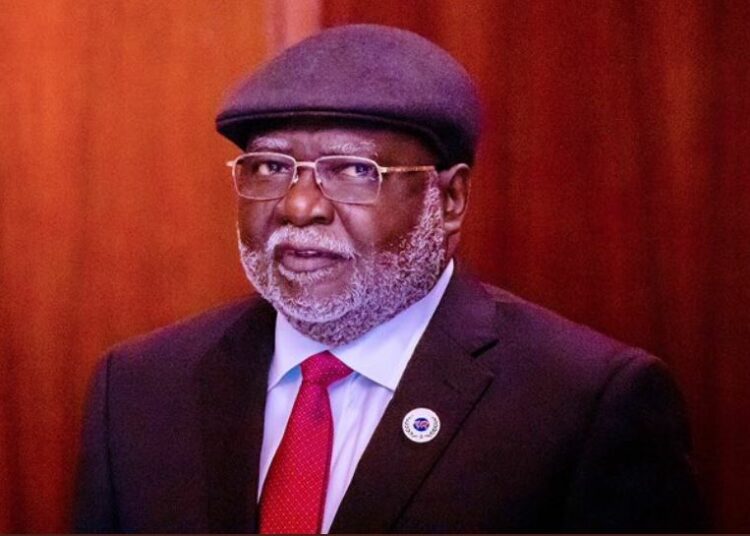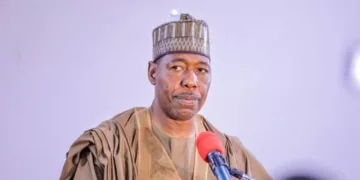Apparently jolted by the declining number of justices of the Supreme Court, chairman of the National Judicial Council (NJC) and Chief Justice of Nigeria (CJN), Justice Olukayode Ariwoola, has commenced the process of appointing 11 new judges to fill the bench depleted bench of the apex court.
This is coming on the heels of the controversy raised by revelation of Justice Musa Dattjio Muhammed over the exclusion of some regions from the Supreme Court.
The number of judges at the highest court in the land had reduced abysmally, stretching their lordships beyond elastic limit with piles of cumulative workload.
The CJN, Justice Ariwoola, had in September last year decried the declining number of justices, saying it has worsened the workload of the court.
LEADERSHIP checks revealed however that the NJC has concluded plans to fill the apex court’s bench to its full complement of 21 justices, a number the court has never achieved.
It was gathered that the NJC is likely to pick the new Supreme Court justices from among 10 Justices of the Court of Appeal for six North Central and South East slots.
The South East and North Central zones of the country no longer have representation at the Supreme Court bench, following the death and retirement of Justice Centus Nweze and Mohammed Dattjio respectively.
Justice Dattjio who represented the North-Central in the apex court retired from the bench on October 27, 2023, while Justice Centus Nweze who hails from Enugu State and represented the South East died on July 30, 3023.
With the exit of the two justices, the two regions no longer have representatives in the court.
LEADERSHIP learnt that already, steps are being taken by the CJN to fill the vacant positions.
Section 230 of the Constitution provides that the Supreme Court of Nigeria shall consist of (a) The Chief Justice of Nigeria (b) Such number of Justices of the Supreme Court, not exceeding Twenty One as may be prescribed by act of National Assembly.
It is expected that the six regions in the country should have three representatives in the apex court bench.
In the history of the court, which was established on October 1, 1963, this is the first time two regions will be having no representation in the court.
At the moment, only nine justices out of the 21 seats on the Supreme Court bench are occupied; 12 seats are currently vacant.
Last week, the CJN said the court is now having the lowest number of Justices in its history.
According to him, the apex court is having only 10 Justices on its bench to tackle the heavy workload of pending cases.
“With Justices Musa Dattijo leaving us today after the retirement of Hon. Justice Adamu Amina Augie a few weeks ago, we are now left with just 10 Justices on the Supreme Court Bench; being the lowest we have ever had in contemporary history of the Court.
“However, I can confidently assure all the litigant public that efforts are in top gear to get on board a sizeable number of Justices to boost our rank and complement the tremendous effort we have been investing in the business of the Court”, he said.
With the number of justices at the Supreme Court reduced to nine, the court still needs about 12 new justices to have a full complement of the court.
Out of the 12, six must come from the South East and North Central, while the remaining five will come from other geopolitical zones.
The remaining ten justices of the court are CJN Ariwoola, Justice Kudirat Kekere-Ekun, who is next in line for the position of CJN, Justice Uwani Musa Abba Aji, JusticeJohn Inyang Okoro, Justice Lawal Garba, Justice Helen M. Ogunwumiju, Justice I.N. M. Saulawa, Justice Adamu Jauro, Justice Tijjani Abubakar and Justice Emmanuel Akomaye Agim.
At the Court of Appeal where the justices, especially the senior ones are expected to gain promotion to the apex court, some of them are due for promotion.
The list of senior Justices of the Court of Appeal, according to the hierarchy, shows that there are about 20 justices from the two regions who have no representation from the appellate court that can make it to the apex court.
One of the senior Justices of the Appeal Court from the North-Central state is Justice Stephen Adam.
He is one of the panel members at the Presidential Election Petitions Court that threw out the petitions filed by Atiku Abukar, presidential candidate of the Peoples Democratic Party (PDP), and Peter Obi, candidate of the Labour Party (LP).
Justice Stephen Adah who is the presiding Justice of the Asaba Division of the Court of Appeal was born on June 13, 1957. He hails from Dekina Local Government Area of Kogi State.
Adah obtained his LL.B degree from Ahmadu Bello University, Zaria, in 1981. He attended the Nigerian Law School, Lagos, for his BL in 1982.
He was appointed a judge of the Federal High Court on November 12, 1998, and later elevated to the Court of Appeal on November 5, 2012. He served as a member of the three-man panel that granted Obi and Atiku’s motions to serve Tinubu their petitions by substituted means.
Adah has delivered verdicts on several cases and one of his landmark decisions was in the appeal filed by the Economic and Financial Crimes Commission (EFCC) in 2020 against a trial court’s decision which partially upheld the no-case submission filed by former President Goodluck Jonathan’s cousin, Robert Azibaola.
He led the panel that affirmed Ifeanyi Ubah as a Senator after his sack over alleged certificate forgery. He also led the panel that affirmed Valentine Ozigbo as the PDP governorship candidate for the Anambra State Governorship election. He is ranked 22nd on the seniority list of the Court of Appeal.
Adah served as a member of the three-man panel that granted Obi and Atiku’s motions to serve Tinubu their petitions by substituted means.
He is ranked 22nd on the Seniority list of the Court of Appeal.
Another senior Justice of the Court of Appeal who is likely to make it to the apex court is Justice Uzoamaka I. Ndukwe-Anyanwu.
At the moment, she is at the peak of the Nigerian bench and has made a mark as a fearless Judge of the Court.
She is held in high esteem as a Judge without bias and fear in the discharge of justice.
Another senior Judge of the court who may be elevated to the apex court is Justice Joseph Shagbaor Ikyegh. He was said to have been transferred to Port-Harcourt Division of the court following his decision on the petition filed by Atiku and Obi at the primary state of hearing.
Justice Juammai Sankey is another very senior justice of the appellate court that may gain elevation to the Supreme Court. She hails from Jos, Plateau State.
She attended the Nigerian Law School, Victoria Island, Lagos State from 1979 to 1980 and was appointed as a judge of Plateau State High Court in 1993.





